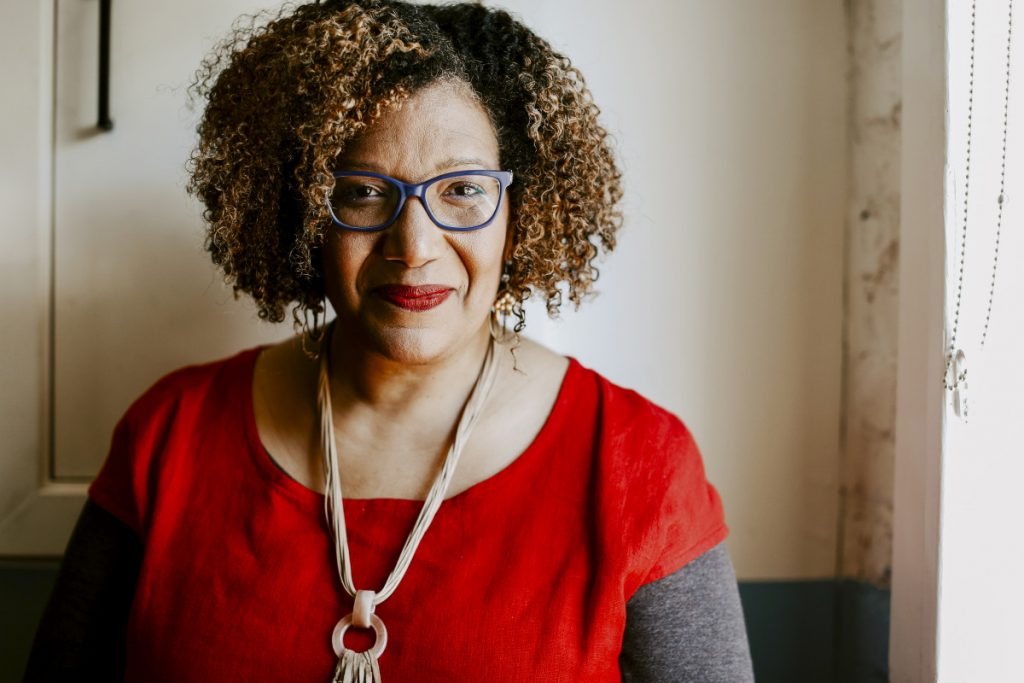
MARY LEE TALBOT – STAFF WRITER
Almost 18 years ago, Lisa Sharon Harper joined a group taking a pilgrimage through the American South. They journeyed first along the Trail of Tears, the trail made by the Cherokee Nation in their forced removal from North Carolina to Oklahoma.
“My people were able to hide in the woods, so we never had to walk the trail,” she told the Rt. Rev. V. Gene Robinson during her interfaith conversation on the CHQ Assembly Video Platform in 2020.
Later in the pilgrimage, the group visited sites related to the history of enslaved Black people.
“I began to wonder if what I was told was good news would be good news to my great-great-great grandmother, Leah Burrows, who was enslaved in South Carolina,” Harper said. “I had been taught to tell people that God has a wonderful plan for your life, and all you need to do is repent of your sins and say a prayer, and you would get into heaven.”
Harper continued, “I imagined myself going up to her front porch and saying, ‘I have good news for you,’ and she would say, ‘What is that, child?’ I would say, ‘All you have to do is repent of your sins and say a prayer, and you will get into heaven.’ And she would just look at me.”
She began to rethink what “good news” might look like to an enslaved person. She took 13 years to study the Bible before writing A Very Good Gospel: How Everything Wrong Can Be Made Right.
“I could finally tell Leah what the real good news is — whole relationships for all people,” she said.
Harper will be the chaplain at Chautauqua Institution for Week Seven, where she will preach at the 10:45 a.m. Sunday ecumenical worship service in the Amphitheater. Her sermon title is “Four Words that Change Everything.” She will also preach at the 9 a.m. Monday through Friday worship services in the Amp.
Her sermon titles include “The Call to Beloved Community,” “Swords, Plowshares, and Vines,” “Daughter,” “The Neighbor You’ll Never Know” and “The Just Ones.”
She is the founder and president of Freedom Road, a consulting group dedicated to shrinking the narrative gap in our nation.
“Narrative gap” is a phrase Harper uses to describe the distance between the stories that people tell themselves about themselves, including how they got in a particular situation and what it will take to make things right.
In the world now, competing narratives vie for loyalty, dividing society and the church, therefore making justice impossible, according to Harper.
Harper leads trainings that increase clergy and community leaders’ capacity to organize people of faith toward a just world.
A prolific speaker, writer and activist, Harper is the founder and president of Freedom Road, a consulting group dedicated to shrinking the narrative gap in our nation by designing forums and experiences that bring common understanding, common commitment and common action.
Harper is the author of several books, including Evangelical Does Not Equal Republican … or Democrat; Left Right & Christ: Evangelical Faith in Politics; Forgive Us: Confessions of a Compromised Faith; and the critically acclaimed The Very Good Gospel: How Everything Wrong Can Be Made Right.
The Very Good Gospel, recognized as the 2016 Book of the Year by the Englewood Review of Books, explores God’s intent for the wholeness of all relationships in light of today’s headlines. A columnist at Sojourners magazine and an Auburn Theological Seminary Senior Fellow, Harper has appeared on Fox News Online, NPR and Al Jazeera America.
Her writing has been featured in CNN Belief Blog, The National Civic Review, HuffPost, Relevant magazine and Essence magazine.
Harper writes extensively on governance, immigration reform, health care reform, poverty, racial and gender justice, climate change and transformational civic engagement.
Harper earned her master’s degree in human rights from Columbia University, and served as Sojourners’ Chief Church Engagement Officer. She fasted for 22 days in 2013 with the immigration reform Fast for Families. She trained and catalyzed evangelicals in St. Louis and Baltimore to engage in the 2014 push for justice in Ferguson, Missouri, after the death of Michael Brown and the 2015 healing process in Baltimore after the death of Freddie Gray. She has also educated faith leaders in South Africa to pull the levers of their new democracy toward racial equity and economic inclusion.




